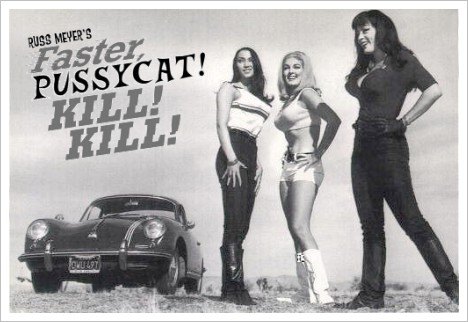VW Profits Up 15%; China's Automakers Also Doing Well

VeeDub in Germany has just issued their numbers for the past nine months of 2008. Viewed through the prevailing “the world is coming to an end” perspective, VW’s financial results are financial pornography, performing better than the male lead in a Russ Meyer movie. We’re talking a 15 percent gain, a money shot of more than $6b pretax. From January to September 2008, VW moved 4.8m units and grabbed a 10.1 percent share of the world market, according to the usually reliable Automobilwoche [sub]. Despite of what’s happening elsewhere in the piston business, Volkswagen’s CFO Hans-Dieter Pötsch stands by his bullish guidance for 2008: the predicted numbers will come true. Elsewhere, China’s automakers have also released profit reports for the third quarter.
From July to September, the 17 companies combined automotive revenues totaled 47.385b yuan ($6.93b), down a mere 2.9 percentage points from last year. Their net profits drooped to 747m yuan, down – oops – 62.4 percent year-on-year, laments the government’s news agency Xinhua via Gasgoo. Never mind. Profits aren’t a Chinese company’s main objective; they often leave that to their presence in Hong Kong, where taxes are low. The notable news: they ain’t losing money.
That said, China’s bad boys are from Detroit’s central casting: China’s former car giant Shanghai GM has completed only 54 percent of its 2008 sales goal. In a wise move, the joint venture reduced this year’s sales target of its Chevrolet brand by 25 percent. Likewise, big cheese Chinese automaker FAW reduced 2008 targets for its Magotan (think VW Passat B6 platform) to 70k units from the 90k target set in January. Which didn’t faze Wolfsburg one bit.

Bertel Schmitt comes back to journalism after taking a 35 year break in advertising and marketing. He ran and owned advertising agencies in Duesseldorf, Germany, and New York City. Volkswagen A.G. was Bertel's most important corporate account. Schmitt's advertising and marketing career touched many corners of the industry with a special focus on automotive products and services. Since 2004, he lives in Japan and China with his wife <a href="http://www.tomokoandbertel.com"> Tomoko </a>. Bertel Schmitt is a founding board member of the <a href="http://www.offshoresuperseries.com"> Offshore Super Series </a>, an American offshore powerboat racing organization. He is co-owner of the racing team Typhoon.
More by Bertel Schmitt
Latest Car Reviews
Read moreLatest Product Reviews
Read moreRecent Comments
- Kjhkjlhkjhkljh kljhjkhjklhkjh A prelude is a bad idea. There is already Acura with all the weird sport trims. This will not make back it's R&D money.
- Analoggrotto I don't see a red car here, how blazing stupid are you people?
- Redapple2 Love the wheels
- Redapple2 Good luck to them. They used to make great cars. 510. 240Z, Sentra SE-R. Maxima. Frontier.
- Joe65688619 Under Ghosn they went through the same short-term bottom-line thinking that GM did in the 80s/90s, and they have not recovered say, to their heyday in the 50s and 60s in terms of market share and innovation. Poor design decisions (a CVT in their front-wheel drive "4-Door Sports Car", model overlap in a poorly performing segment (they never needed the Altima AND the Maxima...what they needed was one vehicle with different drivetrain, including hybrid, to compete with the Accord/Camry, and decontenting their vehicles: My 2012 QX56 (I know, not a Nissan, but the same holds for the Armada) had power rear windows in the cargo area that could vent, a glass hatch on the back door that could be opened separate from the whole liftgate (in such a tall vehicle, kinda essential if you have it in a garage and want to load the trunk without having to open the garage door to make room for the lift gate), a nice driver's side folding armrest, and a few other quality-of-life details absent from my 2018 QX80. In a competitive market this attention to detai is can be the differentiator that sell cars. Now they are caught in the middle of the market, competing more with Hyundai and Kia and selling discounted vehicles near the same price points, but losing money on them. They invested also invested a lot in niche platforms. The Leaf was one of the first full EVs, but never really evolved. They misjudged the market - luxury EVs are selling, small budget models not so much. Variable compression engines offering little in terms of real-world power or tech, let a lot of complexity that is leading to higher failure rates. Aside from the Z and GT-R (low volume models), not much forced induction (whether your a fan or not, look at what Honda did with the CR-V and Acura RDX - same chassis, slap a turbo on it, make it nicer inside, and now you can sell it as a semi-premium brand with higher markup). That said, I do believe they retain the technical and engineering capability to do far better. About time management realized they need to make smarter investments and understand their markets better.


































Comments
Join the conversation
As a former owner of a 2000 Jetta 2.0 and a Golf 1.8t I swore off VW forever. Both cars had a rap sheet as long as my arm. They were wonderful to drive, but the reliability was awful. Those cars were the low-point of the MKIV platform. Friends that had 2003 model year cars had very few problems. I bought a 2007 G35 that I loved - but it developed an engine problem that the dealer and Nissan NA did not want to fix. (Engine vibration/timing problems at low speeds is normal?) After driving a bunch of small, fun to drive, fuel efficient cars, I found myself back at the VW dealer. I bought a 2008 GTI w/DSG transmission. Yes, I know - VW has a lot to prove in terms of longevity, but this car is a peach. It's put together solidly, it's a blast to drive, and it gets pretty good mileage. The only other car that came close was a MINI. I couldn't justify $6000 more for a car I liked less. VW does have some pretty compelling vehicles right now - the Passat CC looks hot, and the MK VI series cars also look good. Hopefully, VW learned their lesson with the MK IV cars. -ted
@Zerofoo: You're right. The turn of the millennium was the dark ages for VW as far as quality was concerned. I was an outside consultant for their taskforce to improve customer satisfaction, and it looked like lifetime employment! These things take a (long) time to rectify. With a lot of sweat, quality can be fixed in a few years, serious improvement takes generations. Customer satisfaction takes even longer. As your post attests, customers don't suffer from Alzheimers when they had been wronged. Quality cars make for proftable companies. Warranty costs down (and way back when, they were HUGE,) word-of-mouth up, bottom line bulging. I wouldn't worry about their longevity. Matter of fact, in Wolfsburg they are already worried about the darn things lasting too long.